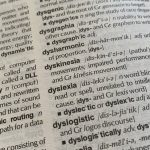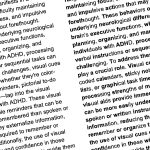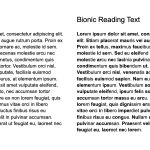Last Updated on 24/10/2025 by James Barron
Abstract
This comprehensive overview delves into the broad spectrum of learning disabilities and difficulties that individuals encounter in their educational pursuits. The content emphasises the importance of differentiating between varied terminologies to accurately comprehend and support affected individuals. A key clarification is made regarding Autism Spectrum Disorder (ASD) and its distinction from learning disabilities, despite its associated learning challenges. The narrative defines learning disabilities as neurological disorders affecting information processing and outlines various classifications, such as Global Developmental Delay (GDD) and Moderate Learning Difficulties (MLD). Specific Learning Difficulties (SpLD) like Dyslexia, Dyscalculia, and Dyspraxia are discussed, showcasing the uniqueness of each condition. The content underscores the critical need for understanding these distinctions, aiding educators, parents, and society in providing tailored support and resources for those in need.
Introduction
Learning disabilities and difficulties span a broad spectrum, encompassing a variety of challenges that individuals face in their educational journeys. In order to adequately understand and support these individuals, it’s essential to differentiate between various terminologies and their meanings. One common question in the realm of learning challenges is the classification of autism.
Is Autism a Learning Disability?
Autism, known more specifically as Autism Spectrum Disorder (ASD), is a developmental disorder that affects social interaction, communication, interests, and behaviour. While individuals with autism often experience learning challenges, it’s essential to note that autism itself is not classified as a learning disability. Instead, it is a neurodevelopmental disorder with its own set of symptoms and interventions. That being said, many individuals with autism also have learning disabilities, but the two should not be conflated.
What is a Learning Disability?
A learning disability is a neurological disorder that affects the brain’s ability to receive, process, store, and respond to information. Individuals with learning disabilities are just as intelligent as their peers, but they process information differently. This difference can create challenges in reading, writing, mathematics, and other academic areas. It is not a reflection of intelligence or ability but rather a different way of processing information.
Global Developmental Delay
Global Developmental Delay (GDD) refers to children who demonstrate significant delays in two or more developmental domains, such as cognitive, social, motor skills, speech, and language. GDD is typically diagnosed before the age of five and indicates that a child is not meeting expected milestones. While some children with GDD might catch up to their peers with early intervention, others might continue to face challenges and might later be diagnosed with a specific learning disability or another developmental disorder.
Learning Difficulties
The term “learning difficulties” is a broader term that encompasses any challenge or obstacle that affects learning. While a learning disability is a specific neurological condition, a learning difficulty might not have a neurological basis. For example, an individual might have difficulty learning due to external factors, such as a lack of prior education, emotional trauma, or other external influences.
Moderate Learning Difficulties (MLD)
Those with Moderate Learning Difficulties (MLD) often find it challenging to acquire skills and knowledge at the same rate as their peers. The gap is more significant than those with mild learning difficulties but not as pronounced as those with severe or profound difficulties. Individuals with MLD often benefit from tailored educational programs and additional resources to aid in their learning.
Specific Learning Difficulties (SpLD)
Specific Learning Difficulties (SpLD) differ from general learning disabilities because they pertain to challenges in one particular area of learning. Examples include Dyslexia (a difficulty with reading), Dyscalculia (a difficulty with math), and Dyspraxia (a motor skill disorder). Despite these challenges in specific areas, individuals with SpLD often excel in other areas of learning.
Learning Difficulties Examples
- Dyslexia: This is perhaps the most well-known learning difficulty, which primarily affects reading and spelling. Individuals with dyslexia might struggle with word recognition, decoding, and phonological awareness.
- Attention Deficit Hyperactivity Disorder (ADHD): While not exclusively a learning difficulty, many with ADHD face challenges in maintaining attention in a learning environment, which can impact their academic progress.
- Dyscalculia: This difficulty relates to math, where individuals may struggle with number sense, calculations, and mathematical reasoning.
- Auditory Processing Disorder: Individuals with this disorder find it challenging to process what they hear in the same way others do, making it hard to recognise subtle differences between sounds in words.
Conclusion
Understanding the nuances between various learning disabilities and difficulties is paramount for educators, parents, and society at large. By differentiating and understanding these terms, we can better support and empower those who face these challenges, ensuring that they receive the tailored education and support they deserve.
Further reading
Overcoming Dyslexia by Sally Shaywitz, M.D.
This book provides a comprehensive look into dyslexia, its identification, and strategies to overcome its challenges.
The Complete Learning Disabilities Handbook: Ready-to-Use Strategies and Activities for Teaching Students with Learning Disabilities by Joan M. Harwell and Rebecca Williams Jackson.
A practical guide for educators and parents, this book offers techniques, strategies, and insights to help students with learning disabilities succeed.
Smart but Scattered: The Revolutionary ‘Executive Skills’ Approach to Helping Kids Reach Their Potential by Peg Dawson and Richard Guare.
This book explores executive skills, which are critical to academic success, especially in children with ADHD and other learning challenges.
LD Online
One of the leading websites on learning disabilities, LD Online offers numerous articles, resources, and expert advice on various learning disabilities and ADHD.
Website URL: http://www.ldonline.org/
Understood
Created for parents, educators, and individuals with learning and attention issues, Understood offers personalised resources and expert insights.
Website URL: https://www.understood.org/
National Center for Learning Disabilities (NCLD)
The NCLD offers resources, research, and advocacy tools for parents, professionals, and individuals with learning disabilities.
Website URL: https://www.ncld.org/
Author Profile
Latest entries
 Resources2024.01.25Animals That Start With The Letter N
Resources2024.01.25Animals That Start With The Letter N Bionic Reading2023.09.22Bionic Reading for Dyslexia: A Potential Bridge to Enhanced Comprehension
Bionic Reading2023.09.22Bionic Reading for Dyslexia: A Potential Bridge to Enhanced Comprehension Bionic Reading2023.09.21Bionic Reading for ADHD: Harnessing the Power of Visual Cues to Aid Focus and Comprehension
Bionic Reading2023.09.21Bionic Reading for ADHD: Harnessing the Power of Visual Cues to Aid Focus and Comprehension Bionic Reading2023.09.20Bionic Reading Method
Bionic Reading2023.09.20Bionic Reading Method




